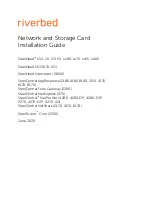
OPTICAL SYSTEMS DESIGN
DOC ID: 10118101
OSD2512 OPERATOR MANUAL
PAGE 95
Max. Reauth. Count
The number of times the switch transmits an EAPOL Request Identity frame without response
before considering entering the Guest VLAN is adjusted with this setting. The value can only
be changed if the Guest VLAN option is globally enabled.
Valid values are in the range [1; 255].
Allow Guest VLAN if EAPOL Seen
The switch remembers if an EAPOL frame has been received on the port for the life-time of
the port. Once the switch considers whether to enter the Guest VLAN, it will first check if this
option is enabled or disabled. If disabled (unchecked; default), the switch will only enter the
Guest VLAN if an EAPOL frame has not been received on the port for the life-time of the
port. If enabled (checked), the switch will consider entering the Guest VLAN even if an
EAPOL frame has been received on the port for the life-time of the port.
The value can only be changed if the Guest VLAN option is globally enabled.
PORT CONFIGURATION
The table has one row for each port on the switch and a number of columns, which are:
Port
The port number for which the configuration below applies.
Admin State
If NAS is globally enabled, this selection controls the port's authentication mode. The
following modes are available:
FORCE AUTHORIZED
In this mode, the switch will send one EAPOL Success frame when the port link comes up,
and any client on the port will be allowed network access without authentication.
FORCE UNAUTHORIZED
In this mode, the switch will send one EAPOL Failure frame when the port link comes up, and
any client on the port will be disallowed network access.
PORT-BASED 802.1X
In the 802.1X-world, the user is called the supplicant, the switch is the authenticator, and the
RADIUS server is the authentication server. The authenticator acts as the man-in-the-middle,
forwarding requests and responses between the supplicant and the authentication server.
Frames sent between the supplicant and the switch are special 802.1X frames, known as
EAPOL (EAP Over LANs) frames. EAPOL frames encapsulate EAP PDUs (RFC3748).
Frames sent between the switch and the RADIUS server are RADIUS packets. RADIUS
packets also encapsulate EAP PDUs together with other attributes like the switch's IP address,
name, and the supplicant's port number on the switch. EAP is very flexible, in that it allows
for different authentication methods, like MD5-Challenge, PEAP, and TLS. The important
thing is that the authenticator (the switch) doesn't need to know which authentication method
the supplicant and the authentication server are using, or how many information exchange
frames are needed for a particular method. The switch simply encapsulates the EAP part of the
frame into the relevant type (EAPOL or RADIUS) and forwards it.
When authentication is complete, the RADIUS server sends a special packet containing a
success or failure indication. Besides forwarding this decision to the supplicant, the switch
uses it to open up or block traffic on the switch port connected to the supplicant.
















































